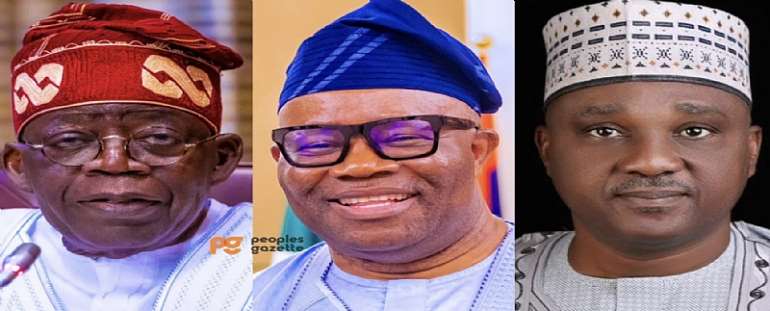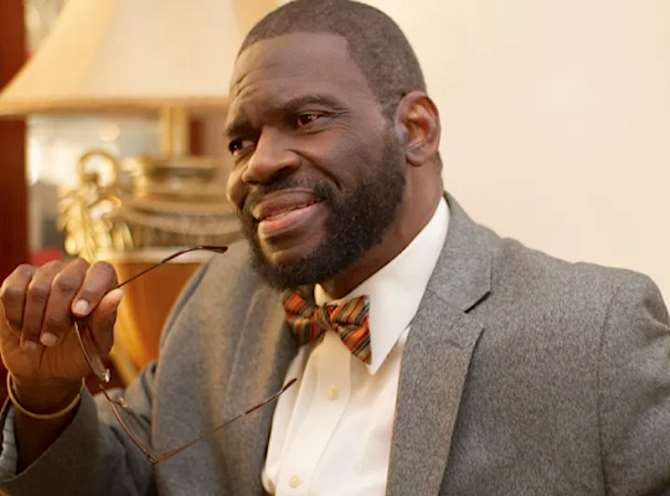President Tinubu As A Man Of Traditions: Advocating Constitutional Protection For Traditional Rulers From Overbearing Politicians

President Bola Tinubu, Senate President Godswill Akpabio, and Speaker of the House of Reps Tajudeen Abbas
Advocating for the Protection of Traditional Rulers from Discourteous Politicians such as Ganduje and Wike: A Pressing Need for Constitutional Reforms and Judicial Integrity
Traditional rulers in Nigeria are enduring unprecedented challenges, primarily due to the unchecked powers of politicians, particularly state governors, who can arbitrarily remove or install them without constitutional protections. This precarious situation underscores the urgent need for constitutional amendments to safeguard traditional institutions and secure the offices of monarchs. Over the years, traditional rulers have experienced a significant decline in influence, exacerbated by the 1966 military incursion and the 1976 local government reforms. Despite persistent efforts by traditional rulers to gain constitutional recognition, their roles remain vulnerable to political manipulation. Governors frequently exert substantial control over traditional institutions, manipulating appointments and removals to serve their political interests. The recent reinstatement of the Emir of Kano, who was controversially dethroned four years ago, exemplifies the ongoing volatility and lack of protection for traditional rulers.
Throughout history, the institution of kingship has held profound significance across Africa, Europe, and Asia, where rulers served not only as political leaders but also as religious, social, and cultural figures. In Africa, kingdoms such as the Kingdom of Kush, Ghana Empire, Mali Empire, and the Kingdom of Aksum demonstrated the power and authority of kings, who played pivotal roles in governance, trade, diplomacy, and the preservation of cultural practices. European kings, from ancient civilizations to medieval monarchies, wielded immense authority, shaping laws, conducting diplomacy, and leading military campaigns, often with the Church's endorsement. Asian monarchs, revered as divine or semi-divine rulers, governed vast territories and promoted cultural advancements, maintaining societal cohesion through their spiritual and administrative roles. The historical significance of kings in these regions underscores their multifaceted influence, extending beyond governance to encompass spirituality, culture, and societal cohesion.
In Nigeria, the abuse and manipulation of traditional rulers by politicians, particularly former state governors like Abdullahi Ganduje of Kano State and Nyesom Wike of Rivers State, have become a longstanding issue that undermines their authority and autonomy. This dynamic often leads to traditional rulers being manipulated or removed for political expediency, rather than for any legitimate reason related to their cultural and societal roles. Ganduje's controversial decision to dethrone the Emir of Kano, Sanusi Lamido Sanusi, in 2020, and Wike's demeaning treatment of a traditional ruler during political rallies, underscore the challenges traditional rulers face in maintaining their independence and neutrality in the face of political pressures. The historical context of colonial influence perpetuates this trend, with post-independence laws continuing to empower governors to depose traditional rulers, thereby stripping them of their inherent authority.
The vulnerability of traditional rulers to political coercion is particularly evident during election seasons, where those displaying independent thinking risk dethronement or other forms of punishment. The practice of coercing traditional rulers to endorse political candidates, even against the will of their people, further highlights the exploitation of their positions for political gain. Such actions infringe upon their rights to freedom of expression and autonomy, as guaranteed by the constitution and international charters.
Recent legal interventions, including court rulings overturning arbitrary dethronements and banishments, provide hope for reinstating the dignity and authority of traditional rulers. Advocacy for legislative reforms to curb governors' unrestrained authority underscores the importance of preserving the integrity and cultural value of traditional institutions. Indeed, historically, politicians, whether presidents, governors, or legislators, were expected to show deference and respect towards traditional kings and rulers. However, in troubled regions like Nigeria, this dynamic has been inverted.
The ongoing turmoil in Kano exemplifies the critical need for clear constitutional protections for traditional rulers to prevent chaotic situations caused by political power struggles. The recent reinstatement of Emir Sanusi and the subsequent deposition of Emir Aminu Ado Bayero by Governor Abba Yusuf underscore the volatile nature of traditional leadership when subjected to political interference. The conflicting court orders, defiance of legal rulings, and accusations of forced removals highlight the precarious position traditional rulers find themselves in without constitutional clarity. The emotional toll on Bayero's family, fearing potential violence and bloodshed over the throne, reflects the high stakes involved when traditional rulers are at the mercy of political whims.
Governor Yusuf's actions, including accompanying Sanusi to the palace and accusing Bayero of disturbing public peace, underscore the need for legal frameworks that delineate the boundaries of power and authority concerning traditional rulers. The conflicting responses from different authorities, such as the police upholding court orders while the governor seeks to assert control, further emphasize the confusion and potential for escalation in the absence of clear legal guidelines.
Caught in between the state government authority and the so-called federal might, the police find themselves in a precarious position. Worse still, the military, despite their attempts to excuse themselves, have no business in local chieftaincy matters, especially when they were seen around the deposed emir’s residence. The unfolding drama in Kano, where governors and judges clash over the destiny of revered emirs, highlights the vulnerability of traditional institutions to external pressures and judicial interventions. The intertwining of political rivalries with chieftaincy matters not only jeopardizes the stability and dignity of traditional rulers but also exposes the judiciary to contentious legal disputes that test the boundaries of jurisdiction and procedural integrity.
The recent controversies surrounding the judicial order halting the reinstatement of Muhammadu Sanusi II as Emir of Kano further highlight the critical importance of protecting traditional rulers from being entangled in political disputes and legal ambiguities. The involvement of the judiciary in such contentious matters underscores the need for clear guidelines and boundaries to prevent undue influence and maintain the integrity of traditional institutions. Allegations against Justice Mohammed Liman, who granted an order from the United States to halt Sanusi's reinstatement, have stirred significant debate among legal experts. While some argue for the global jurisdiction of virtual court proceedings, others emphasize the importance of territorial authority in the Nigerian judicial system, especially regarding high-profile cases that impact cultural and traditional institutions.
The Federal High Court's rules allow judges to conduct judicial activities outside the country under specific circumstances, such as international arbitration proceedings. However, the controversy arises when a judge presides over a case virtually from abroad, raising concerns about adherence to territorial boundaries and the implications for legal proceedings within Nigeria. As Nigeria grapples with the delicate balance between tradition and modernity, the imperative to fortify the legal framework surrounding traditional rulers becomes paramount. By championing clarity, integrity, and respect for established boundaries within the judicial system, Nigeria can pave the way for a harmonious coexistence where the cultural heritage and societal roles of traditional rulers remain safeguarded and revered, free from the turbulent tides of political strife and legal uncertainty.
In conclusion, the situation in Kano, Nigeria, highlights the urgent need for clear constitutional protections for traditional rulers to prevent power struggles and safeguard the integrity of traditional institutions. President Tinubu, as a man deeply rooted in traditions, has the opportunity to lead the charge in advocating for legislative reforms that limit governors' unchecked powers and uphold the dignity and authority of traditional rulers. By doing so, he can set a precedent for respecting the cultural heritage and roles of traditional rulers in Nigeria, ensuring their stability and independence in contemporary society.
Prof John Egbeazien Oshodi
Professor John Egbeazien Oshodi, born in Uromi, Edo State, Nigeria, is an American-based police and prison scientist, forensic psychologist, public policy psychologist, and legal psychologist. He’s a government advisor on forensic-clinical psychological services in the USA and the founder of the Dr. John Egbeazien Oshodi Foundation for Psychological Health. With a significant role in introducing forensic psychology to Nigeria through N.U.C. and Nasarawa State University, he’s also a former Secretary-General of the Nigeria Psychological Association. He’s taught at esteemed institutions like Florida Memorial University, Florida International University, Nova Southeastern University, and more, and is currently an online faculty member at Weldios University, Nexus International University, and Walden University. [email protected]

